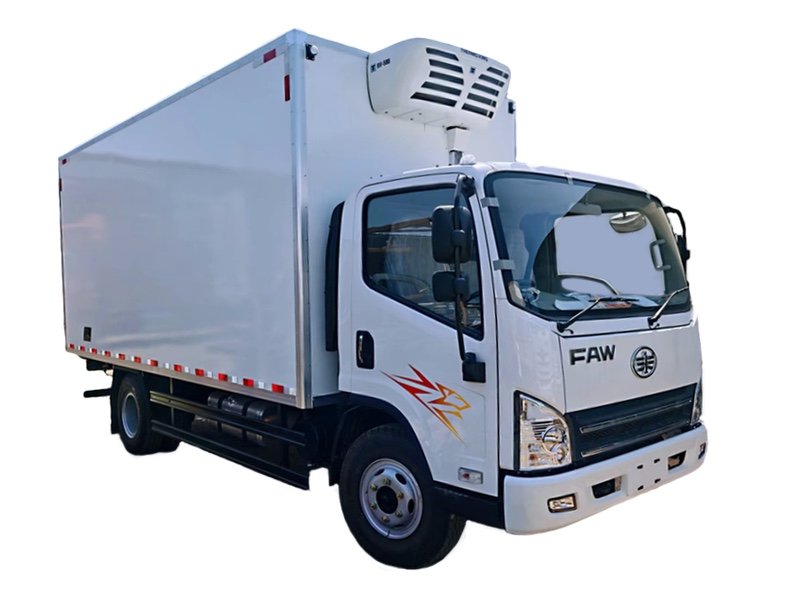Reefer Trucks Thermo King: Leading the Way in Cold Chain Modern Technology
Reefer Trucks Thermo King: Leading the Way in Cold Chain Modern Technology
Blog Article
Choosing the Right Transport Refrigeration System for Your Fleet
Choosing an appropriate transport refrigeration system for your fleet is a crucial decision that can significantly influence operational effectiveness and item integrity. It demands a comprehensive understanding of your certain refrigeration needs, consisting of temperature needs and delivery routines.
Understanding Your Refrigeration Requirements
When selecting a transport refrigeration system, recognizing your certain refrigeration demands is critical to making sure product top quality and compliance with industry criteria. Different factors should be taken into consideration to figure out one of the most suitable system for your procedure. These consist of the sort of items being transported, their temperature level needs, and the duration of transportation.
For perishable goods, such as fresh produce or drugs, exact temperature level control is essential. Comprehending the temperature array needed for each and every product permits the choice of a system that can preserve those conditions continually. In addition, think about the frequency of shipments and the range traveled; longer trips may require systems with boosted insulation or back-up power alternatives to stop temperature level fluctuations.

Additionally, the capability of the refrigeration unit need to line up with your lots size. Straining a system can cause inadequate cooling, while an extra-large system might be costly and ineffective. Last but not least, governing conformity is necessary; familiarize on your own with international and local standards controling the transport of temperature-sensitive goods. By extensively assessing these factors, you can guarantee that your picked transport refrigeration system effectively fulfills your functional needs and maintains product stability.
Kinds Of Transport Refrigeration Solution
Choosing the appropriate kind of transportation refrigeration system is vital for guaranteeing the safe transportation of temperature-sensitive products. There are a number of systems readily available, each developed to meet specific demands and applications.
The most common types include direct development (DX) systems, which utilize refrigerant to take in warm and cool down the cargo location effectively. These systems are usually preferred for their performance and reduced first prices. An additional choice is the main refrigeration system, which offers several compartments or vehicles from a single compressor unit. This is especially useful for bigger fleets calling for regular temperature control throughout different transportation units.
Additionally, there are self-contained refrigeration systems that combine the compressor and evaporator in one plan. When space is restricted, these systems are perfect for smaller sized cars or. For specialized applications, such as moving perishables or drugs, cryogenic refrigeration systems might be utilized, employing liquid nitrogen or carbon dioxide to maintain ultra-low temperatures.
Finally, crossbreed refrigeration systems that integrate electrical and diesel power are coming to be increasingly preferred, providing versatility in power usage and reducing ecological effect. Comprehending these various types enables fleet operators to make informed decisions tailored to their particular functional needs.
Key Attributes to Think About
How can one guarantee that a transportation refrigeration system meets all functional requirements? To achieve this, numerous essential functions need to be thoroughly examined. First of all, temperature control is critical; systems ought to provide exact temperature level settings to fit different items, ranging from iced up products to disposable products.
Energy efficiency is another essential consideration, as it influences functional expenses. Look for systems that utilize sophisticated technology, such as variable rate compressors, to enhance energy use without endangering performance.
An additional function to assess is the integrity and durability of the devices. Systems constructed from premium materials and designed for durability against rough conditions will decrease upkeep expenses and downtime.
Additionally, the simplicity of maintenance and accessibility of parts can considerably affect functional efficiency (reefer trucks thermo king). Attributes like modular styles or remote surveillance abilities can improve service procedures
Last but not least, compatibility with existing fleet management software program can improve monitoring and reporting processes. By concentrating on these essential functions, fleet operators can make certain that their transport refrigeration systems not just meet current needs yet additionally adapt to future needs.

Budgeting for Refrigeration Solutions
Assessing essential features of transportation refrigeration systems is only one component of guaranteeing operational efficiency; budgeting for refrigeration solutions is just as essential. A well-structured spending plan not just encompasses the first acquisition cost but likewise takes into consideration long-lasting functional costs, including power intake, maintenance, and prospective fixing needs.
When establishing a budget plan, fleet supervisors must initially analyze the total expense of ownership (TCO) This consists of not only the purchase expenses however additionally continuous costs associated to fuel efficiency and the longevity of the refrigeration devices. Choosing systems with higher power performance rankings may produce significant financial savings in time, reducing upfront expenses.
Furthermore, fleet operators need to make up possible scalability. As companies grow, the refrigeration requires may change, necessitating upgrades or added units. Planning for these future costs can stop monetary strain.
Funding alternatives can additionally play a crucial role in budgeting. Leasing, lendings, or outright acquisitions each have distinctive monetary ramifications, and recognizing these can aid in making a notified decision. Inevitably, a comprehensive spending plan that takes into consideration both immediate and future demands ensures that transportation refrigeration systems contribute positively to the total functional effectiveness of the fleet.
Maintenance and Support Options
In the realm of transportation refrigeration systems, reliable upkeep and support choices are crucial for making certain ideal performance and durability. Regular upkeep is necessary to stop failures and maintain the honesty of temperature-sensitive freight. It is a good idea to establish a regular evaluation routine with certified specialists that can perform essential checks and repairs on refrigeration units.
Support choices must include a durable solution arrangement, covering both regular thermo king truck refrigeration units upkeep and emergency situation repairs. This makes certain that your fleet has access to trigger help, minimizing downtime and maintaining functional efficiency. Several producers use extensive assistance bundles that include training for your personnel, allowing them to perform fundamental troubleshooting and upkeep tasks.
In addition, utilizing remote tracking technology can boost your upkeep technique - thermo king truck refrigeration units. These systems give real-time data on temperature level and efficiency, permitting aggressive measures before issues intensify. Spending in training and modern technology not only improves your fleet's reliability however likewise prolongs the life expectancy of your refrigeration systems
Inevitably, a strategic strategy to upkeep and support will protect your investment and ensure that your transport refrigeration systems operate at peak efficiency, providing consistent outcomes for your service.

Conclusion
In verdict, picking the appropriate transportation refrigeration system for a fleet necessitates a comprehensive examination of specific refrigeration needs, system kinds, and necessary functions. In addition, mindful budgeting and planning for future scalability will add to the lasting success of the refrigeration approach.
Choosing a suitable transportation refrigeration system for your fleet is a critical choice that can significantly influence functional performance and item integrity.When picking a transportation refrigeration system, understanding your details refrigeration requirements is paramount to making sure item top quality and compliance with industry requirements. By extensively examining these variables, you can make sure that your chosen transport refrigeration system efficiently satisfies your operational requirements and preserves item honesty.
Ultimately, a thorough budget that thinks about both future and instant demands makes sure that transportation refrigeration systems contribute favorably to the overall operational performance of the fleet.
In conclusion, choosing the proper transport refrigeration system for a fleet demands an extensive evaluation of particular refrigeration demands, system types, and vital attributes.
Report this page